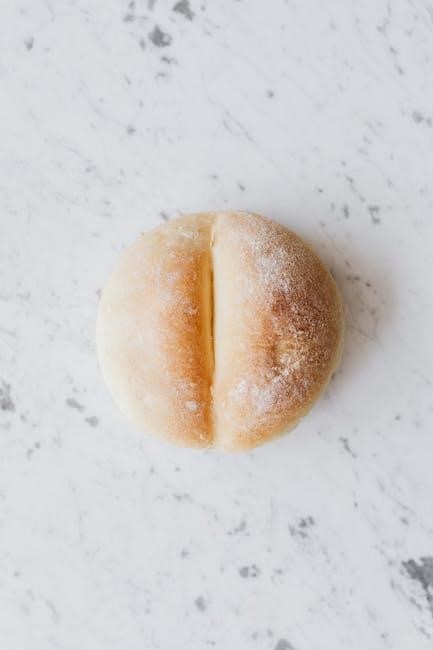The 1900 Calorie Meal Plan is a structured dietary approach, offering a balanced intake of nutrients with a daily calorie breakdown of 500 for breakfast, 750 for lunch, and 450 for dinner, designed to support weight management and overall health.
What is a 1900 Calorie Meal Plan?
A 1900 Calorie Meal Plan is a daily dietary structure designed to provide approximately 1900 calories, divided into three main meals: breakfast (500 calories), lunch (750 calories), and dinner (450 calories). This plan is tailored for individuals seeking to manage their weight or maintain a healthy lifestyle, offering a balanced intake of nutrients. It focuses on portion control and nutrient-dense foods to ensure overall well-being. The plan is often recommended for those with moderate activity levels or specific dietary needs. By adhering to this structure, individuals can achieve their health goals while enjoying varied and flavorful meals. It serves as a practical guide for organizing daily food intake effectively.
Benefits of a 1900 Calorie Diet
A 1900 Calorie Diet offers numerous health benefits, including weight management, improved energy levels, and enhanced overall well-being. It supports moderate activity levels while maintaining a balanced nutrient intake. This plan helps in portion control, reducing overeating and promoting healthier eating habits. It also aids in maintaining muscle mass by providing adequate protein and essential nutrients. Additionally, it supports sustainable weight loss by creating a calorie deficit without extreme restriction. The structured approach helps individuals make informed food choices, aligning with long-term health goals. By focusing on nutrient-dense meals, it ensures the body receives necessary vitamins and minerals, supporting immune function and overall vitality.

Structure of the 1900 Calorie Meal Plan
The 1900 Calorie Meal Plan is divided into three balanced meals: breakfast (500 calories), lunch (750 calories), and dinner (450 calories), ensuring a balanced daily intake.
Breakfast: 500 Calories
A healthy 500-calorie breakfast is essential to kick-start your day. Options include oatmeal with fruits and nuts, scrambled eggs with whole-grain toast, or Greek yogurt with berries and granola. These meals provide a balance of carbohydrates, protein, and fats, ensuring sustained energy and satisfaction. Incorporating whole grains, lean proteins, and healthy fats helps maintain nutritional balance. For variety, consider smoothies with spinach, banana, and almond milk or avocado toast with a poached egg. This meal sets the tone for a day of mindful eating, aligning with your 1900-calorie goal while keeping you energized and focused.
Lunch: 750 Calories
Lunch, the largest meal of the day, provides 40% of your total calories, totaling 750 calories. It’s designed to keep you energized and focused throughout the afternoon. Balanced options include grilled chicken with quinoa and vegetables, whole-grain wraps with lean turkey, or a hearty salad with avocado and legumes. Incorporate a mix of complex carbs, lean proteins, and healthy fats to maintain satisfaction and nutrient intake. Variety is key—experiment with different cuisines or add a side of fruit or nuts for extra flavor and fiber. This meal supports your energy needs while aligning with your overall calorie goals, ensuring you stay on track without feeling deprived.
Dinner: 450 Calories
Dinner, the final meal of the day, should be light yet satisfying to support your calorie goals. Aim for a balanced mix of lean proteins, vegetables, and whole grains. Grilled fish, baked chicken, or tofu are excellent protein sources, paired with steamed vegetables like broccoli, spinach, or carrots. A small portion of quinoa, brown rice, or a whole-grain salad can complement the meal. Incorporate healthy fats like olive oil or avocado for flavor and nutrient absorption. Keep portion sizes controlled to stay within the 450-calorie limit. Avoid heavy sauces or processed foods to maintain a nutritious profile. End with herbal tea or water to aid digestion and hydration. This meal helps wind down your day while keeping your diet on track.

Balancing Macronutrients in the Meal Plan
A 1900-calorie meal plan requires a balanced mix of carbohydrates, proteins, and fats to ensure energy, muscle repair, and proper nutrient absorption, optimizing overall health and function.
Carbohydrates: Energy Source

Carbohydrates are the body’s primary energy source, fueling daily activities and supporting brain function. In a 1900-calorie meal plan, they should comprise 45-65% of total calories, focusing on complex carbs like whole grains, fruits, and vegetables. These provide sustained energy and essential nutrients. Avoid refined sugars and opt for fiber-rich options to maintain blood sugar balance and promote satiety.
Aim for 200-250g of carbs daily, distributed across meals. Pairing carbs with proteins and fats enhances nutrient absorption and overall meal satisfaction. This balance ensures energy needs are met while supporting weight management goals. Proper portion control is key to staying within the calorie limit.
Proteins: Muscle Repair and Growth
Proteins are essential for muscle repair and growth, playing a vital role in overall health. In a 1900-calorie meal plan, aim for 15-20% of calories from protein, translating to 60-80g daily. Include lean sources like poultry, fish, eggs, and legumes to support muscle maintenance and satisfaction. Plant-based options such as tofu, beans, and quinoa are excellent for vegetarian diets. Adequate protein intake helps preserve lean muscle mass during weight loss, ensuring metabolism stays active. Distribute protein evenly across meals, with 20-25g per meal, to maintain muscle synthesis and energy levels throughout the day. Pairing protein with complex carbs and healthy fats enhances meal balance and supports long-term dietary goals.

Fats: Essential for Nutrient Absorption

Fats are crucial for overall health, aiding in the absorption of fat-soluble vitamins like A, D, E, and K. In a 1900-calorie meal plan, 20-30% of calories should come from fats, with a focus on unsaturated sources like avocados, nuts, olive oil, and fatty fish. These fats support heart health and provide essential fatty acids. Avoid excessive saturated fats from processed foods and opt for healthier alternatives to maintain a balanced diet. Incorporating the right types of fats enhances nutrient utilization and supports energy levels, ensuring the body functions optimally while adhering to the calorie goals of the meal plan.

Special Dietary Needs and Adjustments
The 1900-calorie meal plan can be tailored to accommodate various dietary preferences and health conditions, ensuring flexibility and personalization for optimal results and adherence to individual needs.
Vegetarian and Vegan Options
A 1900-calorie meal plan can easily accommodate vegetarian and vegan preferences by focusing on plant-based proteins, whole grains, and healthy fats. Incorporate lentils, tofu, quinoa, and legumes as protein sources. Whole grains like brown rice, oats, and whole-wheat bread provide sustained energy. Avocados, nuts, and seeds offer essential fats. Vegan alternatives to dairy, such as almond or soy milk, can be substituted in recipes. Ensure meals are balanced by including a variety of colorful vegetables and fruits to meet vitamin and mineral needs. Meal planning tools can help create personalized vegan and vegetarian options that align with the 1900-calorie goal, making it easy to stay on track while adhering to dietary preferences.
Low-Carb Alternatives
For individuals following a low-carb diet, the 1900-calorie meal plan can be adapted by substituting high-carb foods with low-carb alternatives. Replace grains like rice, pasta, and bread with vegetable-based options such as cauliflower rice or zucchini noodles. Incorporate more protein-rich foods like lean meats, fish, and eggs, along with healthy fats like avocado, nuts, and seeds. Low-carb vegetables such as spinach, broccoli, and bell peppers can be added generously to meals. Online meal planning tools can help tailor the plan to ensure it meets low-carb requirements while maintaining the 1900-calorie intake. This approach supports weight management and satisfies dietary preferences effectively.

Creating a Personalized 1900 Calorie Meal Plan
Use online meal planning tools to tailor the 1900-calorie diet to your preferences and needs. Adjust portion sizes and food choices to maintain flavor and variety while staying within the calorie limit. Incorporate protein, healthy fats, and complex carbs to ensure balanced nutrition. Regularly track your progress and make adjustments as needed to achieve your health goals. This personalized approach ensures the meal plan is both effective and sustainable for long-term success.
Using Online Meal Planning Tools
Online meal planning tools are a convenient way to customize your 1900-calorie diet. These tools offer extensive food databases, allowing you to input preferences and dietary goals. They generate tailored meal plans, ensuring balanced nutrition and calorie control. Features like macronutrient tracking and recipe suggestions help maintain variety and flavor. Many platforms also allow adjustments based on progress or changing needs. By leveraging these tools, you can create a structured yet flexible eating plan that aligns with your lifestyle and health objectives. Regularly updating your preferences ensures the plan remains effective and enjoyable over time.

Tracking Progress and Adjustments
Tracking progress is essential to ensure the 1900-calorie meal plan aligns with your health and weight goals. Regularly monitor weight, measurements, and energy levels to assess effectiveness. Adjustments may include modifying portion sizes or swapping food items to maintain variety and satisfaction. Online tools and mobile apps can help track daily intake and physical activity, providing insights to refine the plan. Monthly reassessments are recommended to account for changes in metabolism or lifestyle. Consistent tracking ensures long-term success, helping you stay motivated and on course to achieve your dietary objectives;



